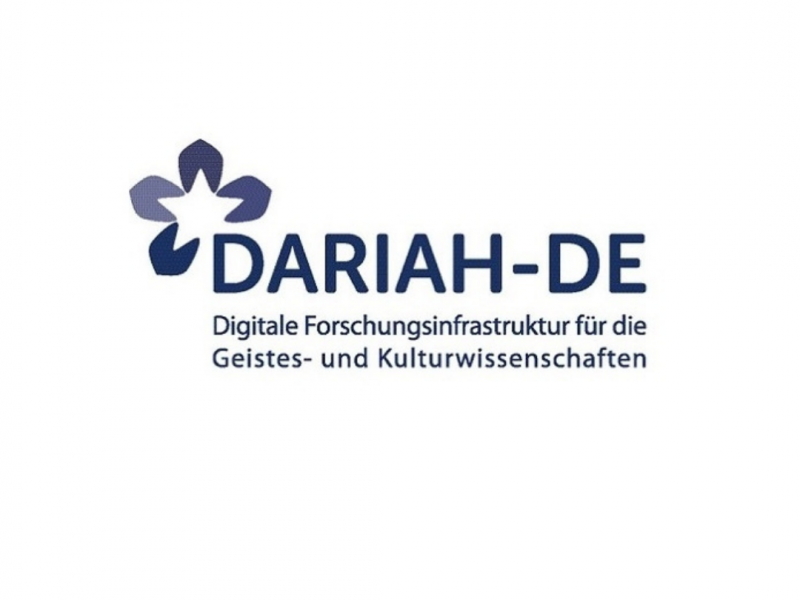DARIAH-DE Grand Tour 2018 in Darmstadt

Date:
19.09.2018 bis 21.09.2018Place:
Darmstadt University of Technology
Categories:
EventFrom September 19 to 21, 2018, DARIAH-DE invited everyone interested in digital humanities to a grand tour in Darmstadt. Eight years of intensive and productive cooperation in the project and with the cooperation partners were recognized, the DARIAH-DE infrastructure and its portfolio of services were presented and the state of development in the field of digital humanities and cultural sciences was reflected on together with numerous experts. The DARIAH-DE-DH-Awards 2018 were also ceremonially presented as part of the Grand Tour.
The Program
Workshops on the following topics, among others
Forschungsdatenmanagement und die DARIAH-DE Datenföderationsarchitektur
The DARIAH-DE data federation architecture (DFA) consists of a large number of interlinked components. Based on the publication of its own research data, the DFA offers functionality to support research data management through to the preparation of the interoperable reuse of published data. On the basis of selected data sets, various stages of the so-called "research-data-lifecycle" are run through in this workshop in order to save and publish data in the long term and finally to prepare for their subsequent use.
12. TextGrid-DARIAH-DE-Nutzertreffen
On September 19, 2018, the twelfth TextGrid / DARIAH user meeting on the topic of "Diversity of Usage Options" took place as part of the DARIAH-DE Grand Tour at the Technical University of Darmstadt. The possibilities offered by the tools and services provided by DARIAH-DE in research and teaching in the digital humanities were presented in lectures and tried out in working groups based on common usage scenarios.
Blogging is increasingly part of the constantly expanding spectrum of scientific publishing. The publication of interim results during research and the discussion of open questions in particular bring new opportunities for exchange and increase the visibility of research, which is usually carried out in temporary projects. In this workshop, aspects of blogging such as science, design & conception, networking & commenting and community building were discussed using the example of the respected, non-commercial blog portal for the humanities and social sciences “de.hypotheses”.
DARIAH-DE Metahosting: Software as a Service for the humanities and cultural studies
The DARIAH-DE metahosting expands the DARIAH-DE research infrastructure into a flexible software-as-a-service solution (SaaS), simplifies software sharing for the humanities and cultural sciences, and enables joint use and exchange of software solutions. The metahosting workshop presented selected SaaS offers that place special emphasis on the needs of humanities and cultural scholars.
Die Konstruktion von historischen Bewegungsprofilen
Reconstruction of movement profiles of historical personalities is of enormous importance for historical research and can provide information not only about how personal networks were built, but also how goods or ideas can have spread. The subject of the workshop was the geographical representation of travel routes as well as their technical requirements and scientific implications for the digital humanities.
Annotieren, analysieren, visualisieren
In this workshop, best practices and application potentials for the transformation of humanities specialist data repositories into semantic knowledge bases were presented and discussed with experts. The aim was to promote the further development and use of semantic indexing strategies, visualizations and interdisciplinary-collaborative annotation methods in order to make specialist repositories usable in a sustainable and efficient manner.
Reproduzierbare Forschung und erweitertes Publizieren mit Jupyter-Notebooks
In this hands-on workshop, the participants were given an insight into programming and publication with Jupyter notebooks using examples and tutorials from the DH. In addition to topics such as expert searches in web sources, texts and databases, distant reading and the integration of research repositories, the participants were able to address their own research topics.
Topic Modeling
LDA Topic Modeling is a statistical method for the content analysis of large text collections. The DARIAH TopicsExplorer makes this method accessible to users without their own programming knowledge for the first time.
In the course of this workshop, the participants used the TopicsExplorer to analyze a collection of plenary minutes of the German Bundestag.
Poster session
DARIAH-DE, CLARIN-D, partner projects and, last but not least, the winners of the DARIAH-DE DH Awards 2018 presented their work with 32 posters.
Panel discussions
Humanities and cultural studies research data: concepts and infrastructures
In the foreground was the question of how research infrastructures for the humanities and cultural sciences should be designed to ensure science-based research and opportunities for participation, which at the same time coordinate distributed competencies and diverse specializations.
Authorship and academic reputation in the digital humanities
How the success of the next generation of academics in the digital humanities can be promoted through appropriate academic structures was one of the subjects of discussion in this panel.
Moderation: Prof. Dr. Andrea Rapp (DARIAH-DE)
Participants: Jun. Prof. Dr. Mark Hall (eHumanities, Univ. Halle), Dr. Christoph Kümmel (DFG), Prof. Dr. Nanette Rißler-Pipka (University of Tübingen) and Prof. Dr. Christof Schöch (University of Trier)
Film recordings as well as a complete film documentation can be found here.

